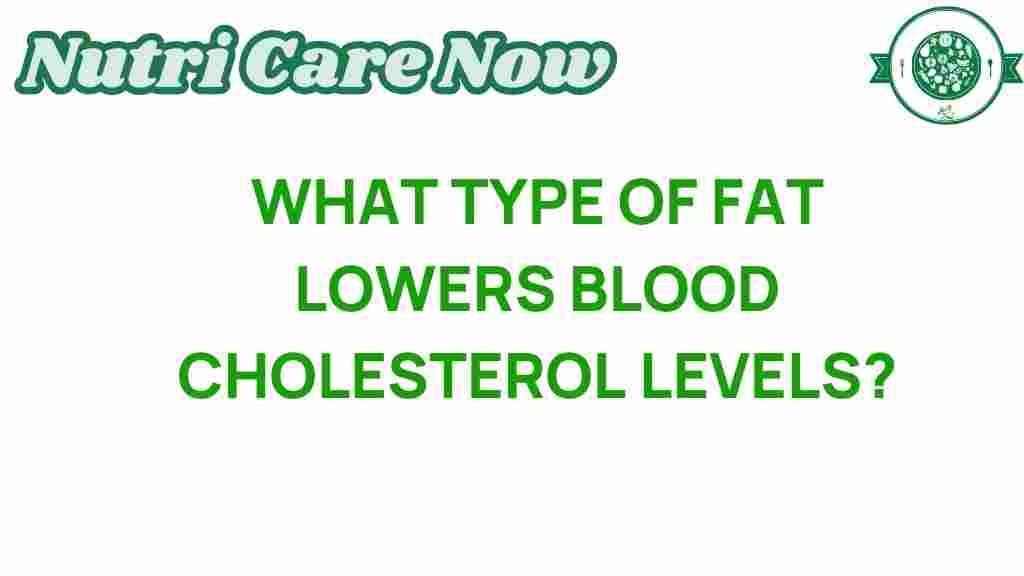Uncovering the Secrets: What Type of Fat Lowers Blood Cholesterol?
Maintaining healthy cholesterol levels is essential for heart health. Cholesterol, a waxy substance found in your blood, is necessary for building cells and producing certain hormones. However, not all cholesterol is created equal. Understanding how dietary fats affect your cholesterol levels can empower you to make better nutritional choices. In this article, we will explore the types of fats that can help lower LDL cholesterol, the so-called “bad” cholesterol, and promote overall heart health.
Understanding Cholesterol and Its Types
Cholesterol is carried through your bloodstream by two main types of lipoproteins:
- Low-Density Lipoprotein (LDL): Often referred to as “bad” cholesterol, high levels of LDL can lead to plaque buildup in arteries, increasing the risk of heart disease and stroke.
- High-Density Lipoprotein (HDL): Known as “good” cholesterol, HDL helps remove LDL cholesterol from the bloodstream, transporting it to the liver for elimination.
To maintain optimal heart health, it is crucial to lower LDL cholesterol and increase HDL cholesterol through lifestyle changes, particularly dietary fats and nutrition.
The Role of Dietary Fats in Cholesterol Management
Dietary fats play a significant role in managing cholesterol levels. Although fat has historically been viewed as something to avoid, it’s essential to understand that not all fats are harmful. In fact, certain types of fats can actually help lower LDL cholesterol and improve heart health.
Types of Healthy Fats That Lower Blood Cholesterol
Here are the primary types of healthy fats that can help lower LDL cholesterol:
1. Unsaturated Fats
Unsaturated fats are considered healthy fats and can help improve cholesterol levels when they replace saturated and trans fats in your diet. There are two main types of unsaturated fats:
- Monounsaturated Fats: Found in olive oil, avocados, and certain nuts, these fats can help increase HDL cholesterol while lowering LDL cholesterol.
- Polyunsaturated Fats: These fats include omega-3 and omega-6 fatty acids, found in fatty fish, flaxseeds, walnuts, and sunflower oil. Omega-3 fatty acids are particularly beneficial for heart health.
2. Omega-3 Fatty Acids
Omega-3 fatty acids are a type of polyunsaturated fat that has been shown to reduce triglycerides and lower blood pressure. They also have anti-inflammatory properties that can benefit heart health. Foods rich in omega-3 fatty acids include:
- Salmon
- Mackerel
- Chia seeds
- Flaxseeds
- Walnuts
3. Replacing Saturated and Trans Fats
To effectively lower LDL cholesterol, it’s crucial to limit saturated and trans fats in your diet. These fats can raise your LDL cholesterol levels and contribute to heart disease. Foods high in saturated fats include:
- Red meat
- Full-fat dairy products
- Butter
- Coconut oil
Trans fats are often found in processed foods, such as baked goods, snack foods, and margarine. Check food labels for “partially hydrogenated oils” to avoid trans fats.
4. Fiber-Rich Foods
While not a fat, dietary fiber plays an essential role in lowering cholesterol levels. Soluble fiber can bind to cholesterol in the digestive system, helping to reduce LDL levels. Foods high in soluble fiber include:
- Oats
- Barley
- Beans and lentils
- Fruits such as apples and citrus
- Vegetables like carrots and Brussels sprouts
Step-by-Step Guide to Incorporating Healthy Fats into Your Diet
Now that you understand the types of fats that can help lower cholesterol, here’s a step-by-step guide to incorporating these healthy fats into your nutrition:
Step 1: Assess Your Current Diet
Begin by taking a close look at your current dietary habits. Identify sources of saturated and trans fats, and note where you can make healthier substitutions.
Step 2: Replace Saturated Fats with Healthy Fats
Start replacing sources of saturated fats with unsaturated fats. For example:
- Use olive oil instead of butter for cooking or salad dressings.
- Incorporate avocados into your meals, such as in salads or on toast.
- Snack on nuts instead of chips or cookies.
Step 3: Include Omega-3-Rich Foods
Make a conscious effort to include omega-3-rich foods in your diet at least twice a week:
- Opt for fatty fish like salmon or mackerel.
- Add flaxseeds or chia seeds to smoothies or oatmeal.
- Snack on walnuts or add them to salads.
Step 4: Increase Fiber Intake
Boost your fiber intake by incorporating more whole grains, fruits, and vegetables into your meals. Choosing high-fiber foods can aid in lowering cholesterol levels:
- Start your day with oatmeal topped with fruit.
- Replace white bread with whole grain or bran bread.
- Include a variety of vegetables in your lunches and dinners.
Step 5: Monitor Your Progress
Keep track of your dietary changes and how they impact your cholesterol levels. Regular check-ups with your healthcare provider can help you monitor your cholesterol and overall heart health.
Troubleshooting Tips for Lowering Cholesterol
If you find it challenging to lower your LDL cholesterol, consider the following tips:
- Consult a Nutritionist: A registered dietitian can provide personalized guidance and meal plans tailored to your needs.
- Stay Active: Regular physical activity can help raise HDL cholesterol and lower LDL cholesterol. Aim for at least 150 minutes of moderate exercise each week.
- Limit Sugary Foods: Reducing sugar intake can also help manage cholesterol levels and improve heart health.
Conclusion
In conclusion, understanding the types of dietary fats that can help lower blood cholesterol is crucial for maintaining heart health. Incorporating healthy fats such as unsaturated fats and omega-3 fatty acids into your diet while reducing saturated and trans fats can lead to improved cholesterol levels and overall wellness. Remember, heart health is a journey that involves mindful nutrition, regular exercise, and lifestyle changes. For more information on heart health and nutrition, you can visit this resource.
By making informed dietary choices, you can take significant steps toward lowering your LDL cholesterol and enhancing your overall heart health. Start today, and your heart will thank you!
This article is in the category Diet and created by NutriCareNow Team
